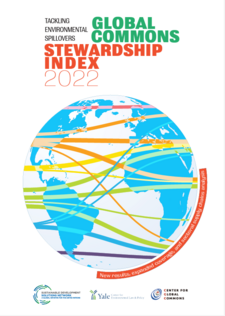Global Commons Stewardship Index
 Sustainable management of the Global Commons – the climate system, ozone layer, land biosphere, oceans, and ice sheets & glaciers – requires data and metrics to guide better policies. To this end, the Yale Center for Environmental Law & Policy has partnered with the University of Tokyo Center for Global Commons (CGC) and Sustainable Development Solutions Network (SDSN) to produce the Global Commons Stewardship (GCS) Index.
Sustainable management of the Global Commons – the climate system, ozone layer, land biosphere, oceans, and ice sheets & glaciers – requires data and metrics to guide better policies. To this end, the Yale Center for Environmental Law & Policy has partnered with the University of Tokyo Center for Global Commons (CGC) and Sustainable Development Solutions Network (SDSN) to produce the Global Commons Stewardship (GCS) Index.
This year’s 2022 GCS Index (3rd edition) provides the latest information on countries’ domestic impacts on the Global Commons and the impacts embodied in trade and consumption (so-called “international spillovers”). Our results reveal that no country has successfully managed to achieve high levels of human development (measured by GDP per capita or the Human Development Index) while fully mitigating their negative impacts on the environment. Rich countries, including many G20 countries, generate large negative spillovers due to unsustainable consumption and obtain the lowest results in this year’s Index. These results suggest that economic systems and national policy frameworks need to better incorporate the value of natural capital – and the costs of failing to protect it – to address international spillovers.
Taking advantage of the latest advances in trade data, environmental research, and industrial ecology, the 2022 GCS Index provides detailed analyses of impacts embodied in international trade flows. Demand for clothing, textiles, and construction materials drives most greenhouse gas (GHG) emissions spillovers. Deforestation spillovers are driven by the demand for forestry, logging, and cattle, and water stress spillovers are driven by the demand for rice and cereals.
The 2022 GCS Index provides scores for 146 entities: 145 countries and the European Union. There are six impact categories: Aerosols, Greenhouse Gas Emissions, Terrestrial Biodiversity Loss, Marine Biodiversity Loss, Nutrient Cycle disruptions, and Water Cycle disruptions. This year’s edition includes 39 indicators using data from official sources and scientific research.
The report calls for additional efforts to build strong data systems at various levels – international, national, industrial, and corporate – building on the latest technologies to monitor and curb negative impacts on the Global Commons.
The GCS Index is part of a larger suite of instruments and reports prepared under the leadership of the CGC at the University of Tokyo’s Institute for Future Initiatives since 2020, in coöperation with SDSN, SYSTEMIQ, the Potsdam Institute for Climate Impact Research, and the World Resources Institute, to inform data and policy priorities to safeguard the Global Commons.
Contact: Etienne Berthet at etienne.berthet@unsdsn.org.
Related resources:
2021 GCS Index
2020 Pilot GCS Index